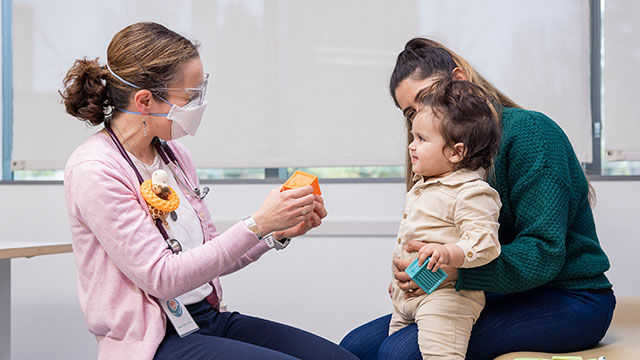MOG Antibody Disease (MOGAD)
Contact the Neuroimmunology Program
What is MOG antibody disease (MOGAD)?
Myelin oligodendrocyte glycoprotein (MOG) is a key protein that makes up the outer layer (myelin sheath) around the nerves. In MOGAD, the immune system attacks MOG proteins with MOG antibodies, causing inflammation that affects how the nerve cells in the brain, or work. This may cause weakness, problems with vision, changes in thinking or behavior, trouble with pooping or peeing or .
MOGAD is called a because the immune system attacks the myelin that protects nerves in the central nervous system (brain, spinal cord and optic nerves that connect the eyes to the brain). It is an disorder, meaning the immune system mistakenly attacks healthy cells instead of viruses and other threats. We do not know the exact cause of the disorder. MOGAD is also called myelin oligodendrocyte glycoprotein antibody–associated disease.
With treatment, most children recover well. But some have long-term effects from a severe first attack or may have repeated attacks (relapsing MOGAD).
What are the symptoms of MOGAD?
Symptoms depend on where MOG antibodies cause inflammation.
Inflammation of the nerves that connect the eyes to the brain () may cause:
- Loss of vision in 1 or both eyes
- Pain when moving the eye(s)
- Less ability to see color
Symptoms related to inflammation of the spinal cord () include:
- Numbness, pain or tingling in the arms or legs
- Trouble pooping or peeing (bowel or bladder control)
- Weakness or loss of the ability to move (paralysis)
Inflammation that mainly affects parts of the brain and spinal cord causes a condition called . Children with ADEM may have 1 or more of these symptoms:
- Fever
- Confusion
- Headache
- Nausea or vomiting
- Tiredness
- Weakness in the arms or legs
- Trouble pooping or peeing ( or control)
How is MOGAD diagnosed?
Accurate diagnosis of this rare disease is key to effective treatment and the best results. If your child shows symptoms of MOG antibody disease, doctors in our Neuroimmunology Program will test their blood for MOG antibodies.
The doctor will order tests to confirm MOGAD and rule out other conditions:
- to get high-quality pictures to assess your child’s brain, spinal cord and the nerves that connect the eyes to the brain. A radiologist who specializes in the nervous system () will analyze the MRI, looking for changes that indicate inflammation.
- to check .
How is MOGAD treated?
Our Neuroimmunology Program provides coordinated care until patients are 21 years old, tailored to their needs. First, we focus on reducing inflammation to stop symptoms. The most common treatment is given into a vein (intravenous) to suppress the immune system. Some children also need to take a steroid by mouth (oral prednisone) or have their blood filtered ().
People with demyelinating diseases that affect the brain may have changes in how their brain develops and works. Our will assess your child’s thinking, learning, emotions and behavior. Based on the results, we provide expert opinions and recommend treatment options to help at school, at home and in the community.
Most children recover well from MOG antibody disease. In some children, symptoms resolve for a while and then come back. Relapses may cause further injury to the nervous system, affecting vision or mobility long term.
For those with returning (relapsing) MOGAD, treatment options include:
- .
- (DMTs) to prevent relapses and limit damage to the central nervous system. The different DMTs work in varied ways to affect the body’s immune response. Depending on the medicine, your child may take them by mouth, injection or infusion.
If your child has long-term effects that involve their vision, mobility, thinking or emotions, they will get care as needed from experts in:
- Neuropsychology
- Rehabilitation medicine
- Ophthalmology
- Physical therapy
- Occupational therapy
- Speech and language services
We have weekly clinics at our hospital campus in Seattle and offer telehealth (virtual) visits. We serve patients throughout Washington, Alaska, Montana and Idaho.
Why choose Seattle Children’s for MOGAD care?
- Our Neuroimmunology Program is the only one of its kind in our 4-state region. We are experts in diagnosing and treating babies, children, teens and young adults with demyelinating disease and other autoimmune disorders that affect the brain.
- Together with the University of Washington, we have been named a Center of Excellence by the Siegel Rare Neuroimmune Association (SRNA).
- Our state-of-the-art expertise, technology and testing help us diagnose your child with precision and get started on the best and most effective therapies. Finding early signs of problems helps improve quality of life and limit disability.
- To help you get all your care in one place, on the same day, our Neuroimmunology Program partners with Radiology for like and with Infusion Services to provide medicines.
- As needed, your child will see experts in neuropsychology, rehabilitation medicine, ophthalmology, physical therapy, occupational therapy and speech and language services.
- Your child will benefit from innovations developed at Seattle Children’s to make treatments safer and more effective. Our patients have the option to take part in clinical trials of promising new therapies. Learn about participating in clinical trials at Seattle Children’s.
Contact Us
- If you’d like an appointment, ask your healthcare provider to refer you to Seattle Children’s Neuroimmunology Program. Our clinic is part of Seattle Children’s Neurosciences Center.
- If you have a referral, call 206-987-2078 for an appointment.
- Providers, see how to refer a patient for Neurosciences care.
Telemedicine at Seattle Children’s
Your first visit will be in person in our clinic. For later visits, you may be offered a telehealth (virtual) appointment.
Paying for Care
Learn about paying for care at Seattle Children’s, including insurance coverage, billing and financial assistance.

